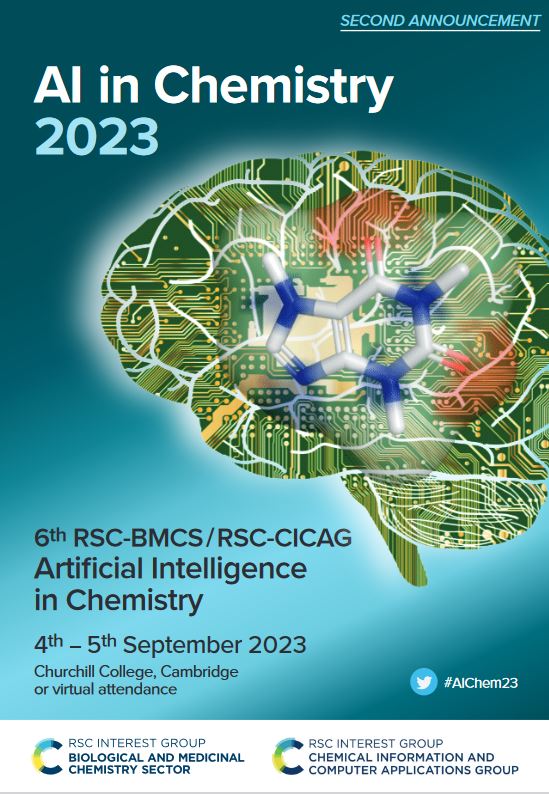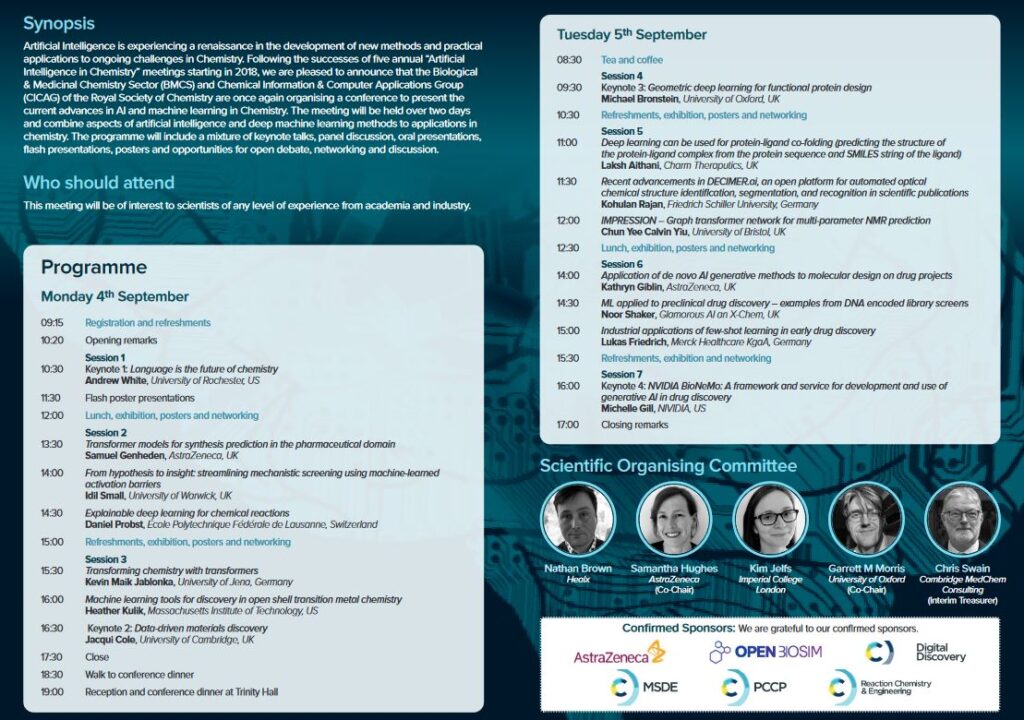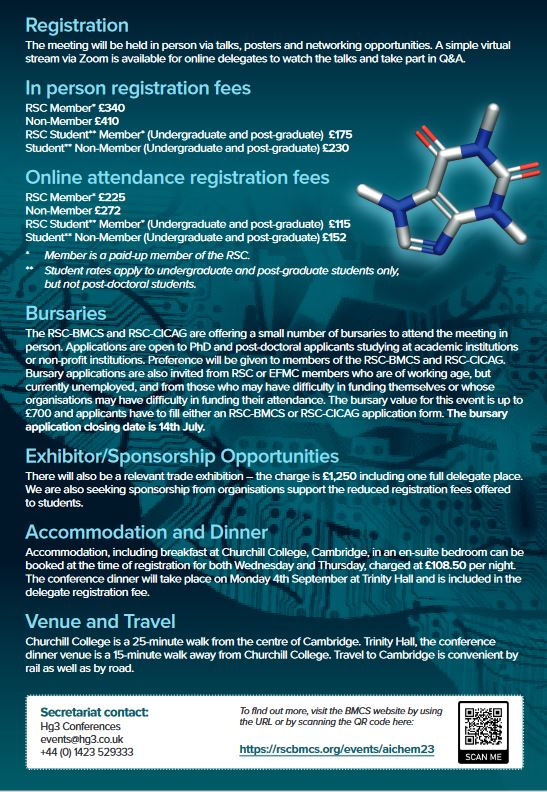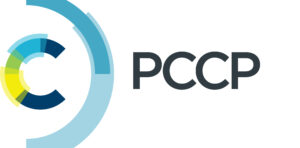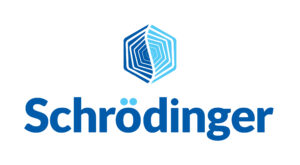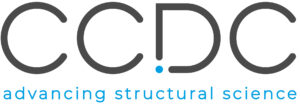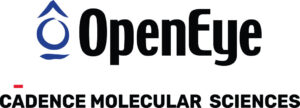6th Artificial Intelligence in Chemistry Symposium
Event
6th RSC-BMCS / RSC-CICAG Artificial Intelligence in Chemistry
Dates
Monday-Tuesday, 4th – 5th September 2023
Place
Churchill College, Cambridge
Important links and downloads
Twitter hashtag – #AIChem23
To download first announcement poster, click here
To download second announcement poster, click here
Synopsis
Artificial Intelligence is experiencing a renaissance in the development of new methods and practical applications to ongoing challenges in Chemistry. Following the successes of five annual “Artificial Intelligence in Chemistry” meetings starting in 2018, we are pleased to announce that the Biological & Medicinal Chemistry Sector (BMCS) and Chemical Information & Computer Applications Group (CICAG) of the Royal Society of Chemistry are once again organising a conference to present the current advances in AI and machine learning in Chemistry. The meeting will be held over two days and combine aspects of artificial intelligence and deep machine learning methods to applications in chemistry. The programme will include a mixture of keynote talks, panel discussion, oral presentations, flash presentations, posters and opportunities for open debate, networking and discussion.
Who should attend
This meeting will be of interest to scientists of any level of experience from academia and industry
Call for Posters / Abstracts
Abstract submissions are now closed!
Poster Prizes
There will be three prizes for the best posters:
Industry prize – Sponsored by Reaction Chemistry & Engineering journal;
Academia Prize – Sponsored by PCCP journal and Molecular Systems Design & Engineering journal;
People’s Prize – Digital Discovery journal;
Want to become a member?
To join the RSC in order to qualify for discounted registration fees at all RSC, please follow this RSC link.
Bursaries – Bursary applications are now closed!
The RSC-BMCS and RSC-CICAG are offering a small number of bursaries to attend the meeting in person. Applications are open to PhD and post-doctoral applicants studying at academic institutions or non-profit institutions. Preference will be given to members of the RSC-BMCS and RSC-CICAG. Bursary applications are also invited from RSC or EFMC members who are of working age, but currently unemployed, and from those who may have difficulty in funding themselves or whose organisations may have difficulty in funding their attendance. The bursary value for this event is up to £700 and applicants have to fill either an RSC-BMCS or RSC-CICAG application form. The bursary application closing date is 14th July.
Registration
The registration is now closed!
In person registration fees
RSC Member* £340
Non-Member £410
RSC Student ** Member* (Undergraduate and post-graduate) £175
Student** Non-Member (Undergraduate and post-graduate) £230
Online attendance registration fees
RSC Member* £225
Non-Member £272
RSC Student ** Member* (Undergraduate and post-graduate) £115
Student** Non-Member (Undergraduate and post-graduate) £152
* Member is a paid-up member of the RSC
** Student rates apply to undergraduate and post-graduate students only, but not post-doctoral students.
Programme
All the timings on the programme are in BST (British Summer Time)
Monday 4th September
| 9:15 | Registration and Refreshments |
| 10:20 | Opening Remarks |
| Session 1 Chair: Garrett M. Morris, University of Oxford, UK |
|
| 10:30 | Keynote 1: Language is the future of chemistry Andrew White, Future House, USA |
| 11:30 | Flash Poster Presentations FO01: DeepStruc: towards structure solution from pair distribution function data using deep generative models Andy Anker, University of Copenhagen, Denmark FO02: OneOPES and Machine-Learning Based Collective Variables: A Recipe for Path-Less Sampling of Protein Conformational Change Simone Aureli, University of Geneva, Switzerland FO03: Leveraging auxiliary assay data to enhance ML-based ADME prediction Mortiz Walter, Boehringer Ingelheim Pharma GmbH {$} Co. KG, Germany FO04: Standardizing chemical compounds with language models Miruna Cretu, IBM Research, UK FO05: A Transformer Neural Network to Rank Coformers for a given API, Trained on the Cambridge Structural Database Isaac Sugden, Cambridge Crystallographic Data Centre, UK FO06: Actionable predictions of human pharmacokinetics at the drug design stage Leonid Komissarov, Roche, Switzerland FO09: AI-driven drug discovery against biomolecular condensates Kadi Sar, Transition Bio, UK FO10: SILVR: Guided Diffusion for Molecule Generation Nicholas Runcie, University of Edinburgh, UK FO11: Found In Translation: Using Language Models To Predict C–H Borylation Regioselectivity Ruslan Kotlyarov, University of Cambridge, UK FO12: Development of Machine Learning algorithms for perovskite materials using structural, compositional and elemental descriptors Jiri Hostas, University of Calgary, Canada FO13: Robustly interrogating machine learning scoring functions: do they learn any biophysics? Guy Durant, University of Oxford, UK FO14: From Spectrum to Structure Ben Honore, University of Bristol, UK FO15: A Small Step Towards Generalisability: Training a Machine Learning Scoring Function for Structure-Based Virtual Screening Lucy Vost, University of Oxford, UK FO16: Syntheseus: a flexible python library for automated synthesis planning Marwin Segler, Microsoft Research Cambridge, UK FO17: From Proteins to Ligands: Decoding Deep Learning Methods for Binding Affinity Prediction Rohan Gorantla, University of Edinburgh, UK FO19: Benchmarking deep generative models for 3D molecular structures Benoit Baillif, University of Cambridge, UK FO20: ProtoScan: Prediction of Off-Target Activity Using Wide-Scope Deep Multi-Task Models Matthew Taylor, University of Warwick, UK FO21: Machine learning designs new GCGR/GLP-1R dual agonists with enhanced biological potency Anna Puszkarska, AstraZeneca, UK FO22: Correcting Molecular Mechanics Binding Free Energies with Machine Learning Potentials Finlay Clarke, The University of Edinburgh, UK |
| 12:00 | Lunch, Exhibition, Posters (odd numbers) and Networking |
| Session 2 Chair: Chris Swain, Cambridge MedChem Consulting, UK |
|
| 13:30 | Keynote 2: Geometric deep learning for functional protein design Michael Bronstein, University of Oxford, UK |
| 14:30 | Explainable Deep Learning for Chemical Reactions Daniel Probst, École Polytechnique Fédérale de Lausanne, Switzerland |
| 15:00 | Transformer models for synthesis prediction in the pharmaceutical domain Samuel Genheden, AstraZeneca, UK |
| 15:30 | Refreshments, Exhibition, Posters (even numbers) and Networking |
| Session 3 Chair: Kim Jelfs, Imperial College London, UK |
|
| 16:00 | Transforming Chemistry with Transformers Kevin Maik Jablonka, University of Jena, Germany |
| 16:30 | Accelerating the Discovery of Synthesisable Porous Materials Through Combined Computational and Experimental Approaches Steven Bennett, Imperial College London, UK |
| 17:00 | Keynote 3: Data-driven materials discovery Jacqui Cole, University of Cambridge, UK |
| 18:00 | Close |
| 18:30 | Walk to Conference Dinner |
| 19:00 | Reception and Conference Dinner at Trinity Hall |
Tuesday 5th September
| 8:30 | Tea and Coffee |
| Session 4 Chair: Nathan Brown, Healx, UK |
|
| 9:30 | Protein-ligand co-folding: predicting the structure of the protein-ligand complex from the protein sequence and SMILES string of the ligand Laksh Aithani, Charm Therapeutics, UK |
| 10:00 | Recent advancements in DECIMER.ai, an open platform for automated optical chemical structure identification, segmentation, and recognition in scientific publications Kohulan Rajan, Friedrich Schiller University, Germany |
| 10:30 | Refreshments, Exhibition, Posters (odd numbers) and Networking |
| Session 5 Chair: Nathan Brown, Healx, UK |
|
| 11:00 | PoseBusters: An evaluation of the physical plausibility of the predictions of deep learning-based docking methods Martin Buttenschoen, University of Oxford, UK |
| 11:30 | IMPRESSION - Graph Transformer Network for multi-parameter NMR Prediction Chun Yee Calvin Yiu, University of Bristol, UK |
| 12:00 | Lunch, Exhibition, Posters (even numbers) and Networking |
| Session 6 Chair: Hannah Bruce-McDonald, Charm Therapeutics, UK |
|
| 13:30 | Industrial Applications of Few-Shot Learning in Early Drug Discovery Lukas Friedrich, Merck Healthcare KgaA, Germany |
| 14:00 | ML applied to Preclinical Drug Discovery- Examples from DNA Encoded library screens Noor Shaker, Glamorous AI and X-Chem, UK |
| 14:30 | Application of de novo AI generative methods to molecular design on drug projects Kathryn Giblin, AstraZeneca, UK |
| 15:00 | Refreshments, Exhibition and Networking |
| Session 7 Chair: Samantha Hughes, AstraZeneca, UK |
|
| 15:30 | Keynote 4: NVIDIA BioNeMo: A Framework and Service for Generative AI in Drug Discovery Michelle Gill, NVIDIA, USA |
| 16:30 | Poster Prizes and Closing Remarks |
| 17:00 | Conference closes |
Sponsorship/Exhibition Opportunities
Bookings are now closed!
Exhibition stand package includes:
– A six-foot trestle table and chair(s);
– Access to electricity and Wi-fi;
– Logo inclusion in pdf delegate handbook and rolling slides;
– Exhibitors promotional page in the pdf delegate handbook;
– Logo included in the communication emails to delegates;
– One exhibitor stand staff with access to the technical sessions and Conference dinner (excluding accommodation)
We are also seeking sponsorship from organisations supporting the low registration fees offered to students. You can support and sponsor this meeting by clicking the booking link above.
Sponsors
We are grateful to our confirmed sponsors for their valued support.
Exhibitors
We are grateful to our confirmed exhibitors for their valued support.
Scientific Organising Committee
Nathan Brown, Healx
Samantha Hughes, AstraZeneca (Co-Chair)
Kim Jelfs, Imperial College London
Garrett M. Morris, University of Oxford (Co-Chair)
Chris Swain, Cambridge MedChem Consulting (Interim Treasurer)
Secretariat Contact
Hg3 Conferences Ltd
+44 (0)1423 529333
E-mail
